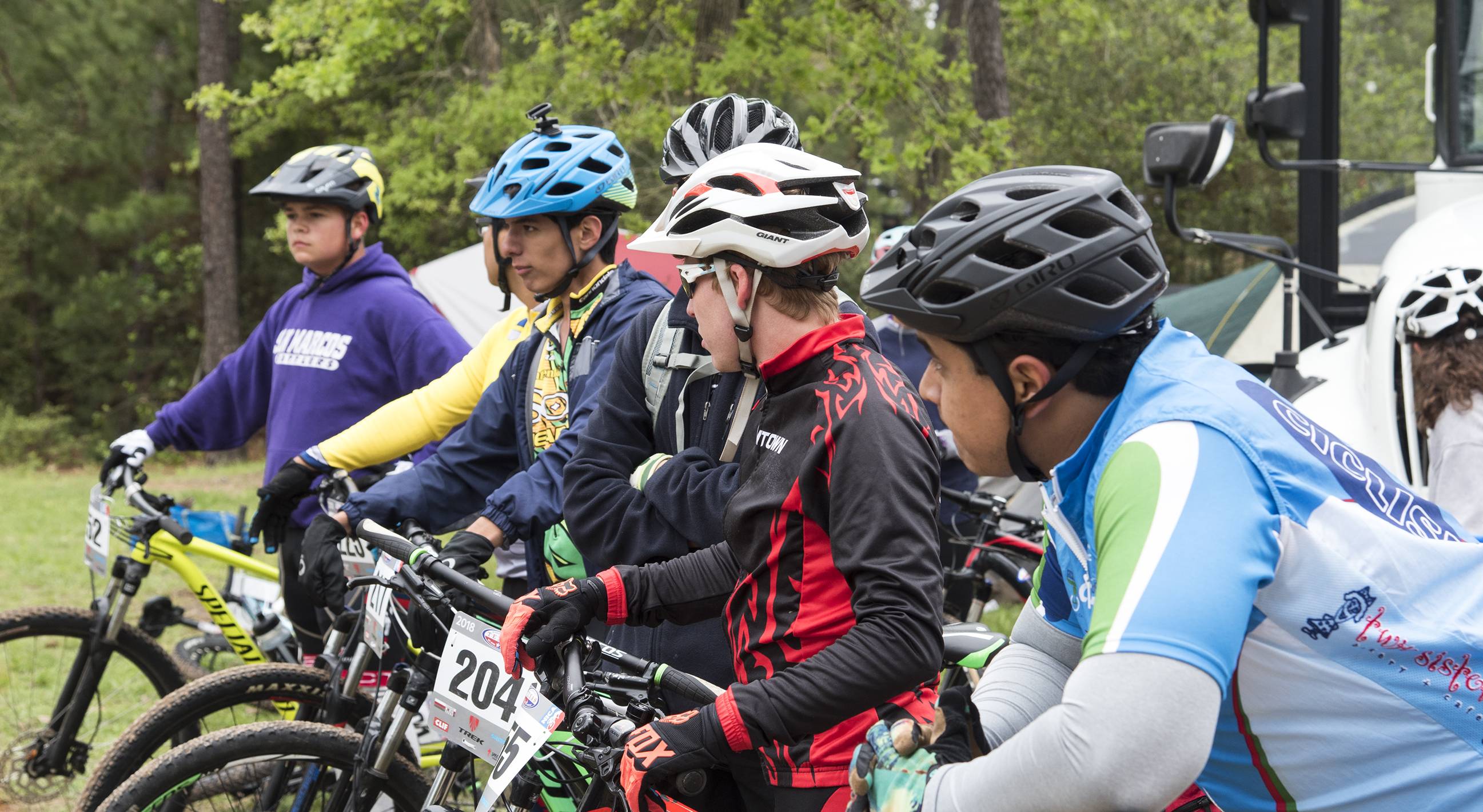
Pedal power
by Ashley Festa
Texas State faculty, alumnus join forces on high school mountain biking team with physical fitness and research in mind
Dr. Kent Griffin has found a way for high school students to participate in a solo sport and yet feel more connected than ever before. It’s a connectivity that’s drawing students to the sport of mountain biking at San Marcos High School.
"Most of the kids on the team are not from athletic backgrounds," says Griffin, associate professor in the Department of Health and Human Performance, and head coach of the team. "Some have participated in after-school athletics, but most have never experienced relatedness like that. They’ve never been connected."
The mountain biking program is through the National Interscholastic Cycling Association, which focuses on the mind, body, and character of each student-athlete. In addition to developing students’ biking skills, the organization also encourages coaches to foster a sense of family and togetherness on the team. Griffin’s team, in four years of existence, has done exactly that.
"When we ask, ‘What did you like about riding?’ in focus groups and interviews," Griffin says, "we almost always hear, ‘It feels like my second family, like brothers and sisters.’ "
Such interviews contribute to Griffin’s research on changing the motivational behaviors of the bikers by meeting three needs, as described in self-determination theory. These needs are: that sense of relatedness, a sense of autonomy, and a sense of competence. He said that students are having all three of those needs met on the team.
"We identify kids who are at risk emotionally, behaviorally, academically, socioeconomically, maybe have demonstrated anti-social behavior," he says. "Many reasons these kids come to us is the excitement of mountain biking, a newer sport. They don’t feel like they have the skills to play other sports, but here’s a new activity and there’s been no physical education class that someone tells them they aren’t good enough to play this." The first thing Griffin does is have the students practice riding on a curb or hill to ensure they feel competent right away.
"Many reasons these kids come to us is the excitement of mountain biking, a newer sport. They don’t feel like they have the skills to play other sports, but here’s a new activity and there’s been no physical education class that someone tells them they aren’t good enough to play this."
— Dr. Kent Griffin
Another draw is that all the equipment is provided. About 90 percent of the team classifies as low socioeconomic status, and expensive sports may not be options for them. When he started the team, Griffin pieced together parts taken from bikes abandoned at the university. Now, with the students’ fundraising efforts as well as $30,000 in grants, the team has acquired about a dozen quality bikes.
The students also learn responsibility through fundraising for the team—including selling gift cards for Mochas and Javas, a local sponsor. The business then donates half the value of the gift cards back to the team.
Another aspect of Griffin’s research is whether the students’ physical fitness improved over the course of the season. Griffin evaluates the athletes’ strength, muscular endurance, flexibility, body composition, and cardiovascular fitness. He says students showed significant improvement.
"Some kids were having trouble finishing a three-mile ride on the road at the beginning of the season," Griffin says, "but at the end of the season, it’s no problem. When they see the gains they’ve made, they feel more competent and in control of that [success]."
One of Griffin’s research papers is currently under review for publication in the Journal of Teaching and Physical Education, and he’s in the process of writing a second paper. He plans to eventually go to other schools across the nation to collect more data to find out whether other teams are experiencing the same successes.
His own team’s achievements can be credited in part to the university’s partnership with San Marcos High School’s Adam Wagner (B.A. ’01), the academic dean of social studies and co-head coach with Griffin. Wagner says the two coaches share a similar philosophy of physical education: finding ways to get young people to continue their physical fitness for the rest of their lives.
"When kids leave our program, when they get in their 30s and 40s, they can still do the sport," Wagner says.
While the students are on the team, the coaches make sure each one experiences encouragement and support. For some, it even keeps them in school. One student, Wagner recalls, was struggling academically and on the verge of dropping out.
Karly Schlievert, a junior studio art major at Texas State, says she joined the mountain biking team the same year it started at the high school. She says it changed her entire outlook on school. "I was really depressed and not enjoying myself at school," says Schlievert, who still bikes for pleasure. "The mountain biking team changed that for me. I was excited to get up and ride my bike to school and practice at the end of the day. It was fun, challenging, and I loved the community and family feel of it."
Griffin says that’s exactly what he intended when he and Wagner started the program. "That’s what kids are getting, and that’s what draws them to the league," he says. "It’s not about winning and losing or competing."✪